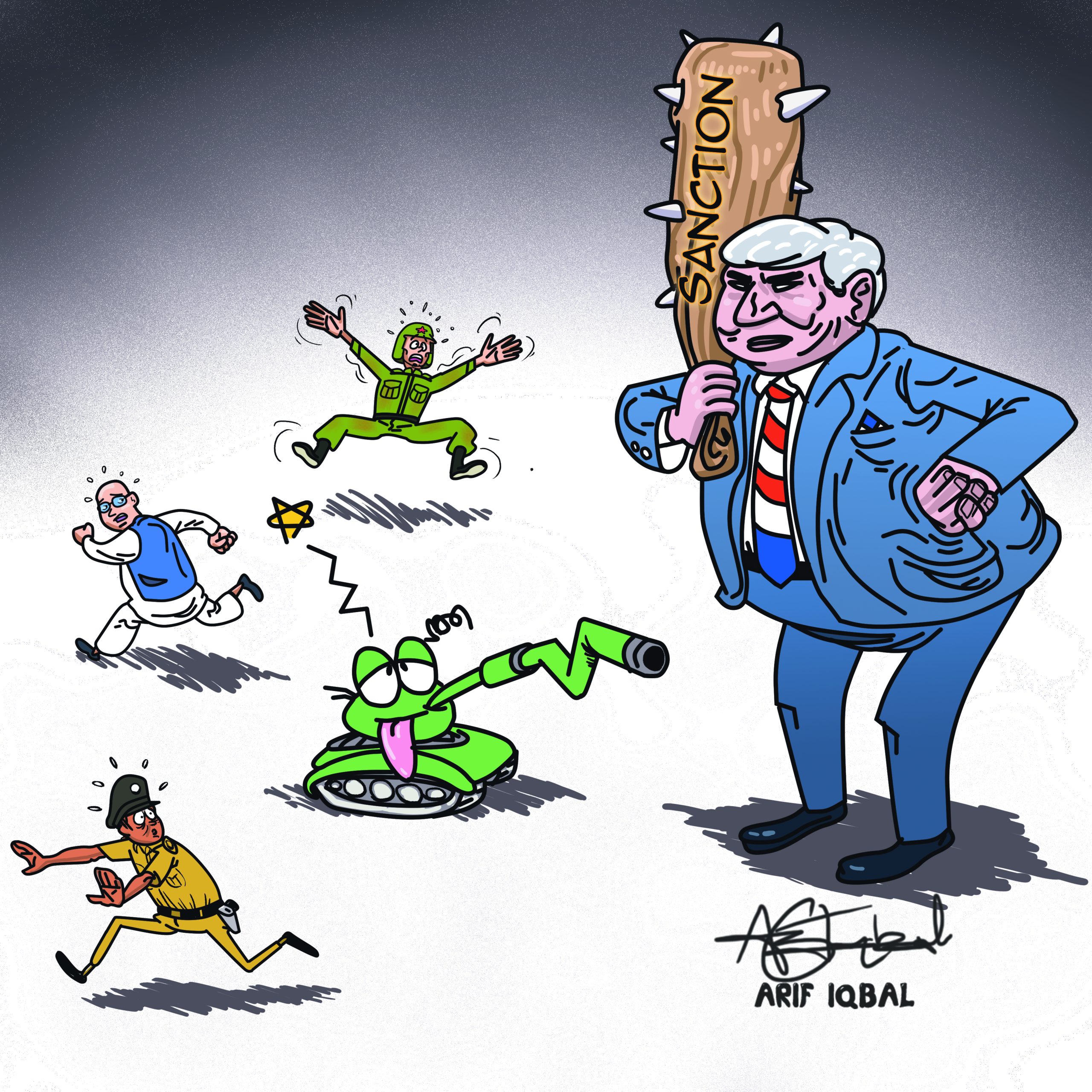Trade embargoes and the cessation of capital and investment flows between the sender, and target countries are examples of economic sanctions. They are commonly used methods to maintain unanimously accepted diplomatic discourse between states. On the other hand, reprisal is an enforcement tactic in response to a state’s violation of international humanitarian law, which in itself is lawful to a very limited extent. In recent years, sanctions have done more harm than good. This article explores the use of economic sanctions in international relations as a means of reprisal – its moral and legal ramifications. The article would portray how economic sanctions are nothing but age-old reprisals that primarily affect the civilian population. Since the latter is not permissible under international law, and hence, economic sanctions should also be reconsidered.
States aim to remain in conformity with one another politically. When the dynamic is seen to be disrupted due to one of the state’s actions, various strides are put in force by a contemporary. Economic sanction is one such step a state or international body takes to forbid, control, or otherwise obstruct economic relations with another state to denounce or influence the target state’s behaviour or policies. If a State violates humanitarian law (e.g., Iraq whilst annexation of Kuwait in August 2, 1990), they may face economic sanctions (e.g., the United Nations sanctioning Iraq) in order to make them comply with the international laws they have previously violated.
On the other hand, reprisals are defined as a violation of international humanitarian law permitted only under corrective circumstances towards States to make them comply with the international humanitarian laws they have previously violated. Although Article 2(4) of the U.N. Charter prohibits reprisals involving the use of force, but not reprisals involving economic sanctions, the similarity in objective between economic sanctions and reprisal is apparent.
The reprisals discussed in this paper are different from acts of retorsion, which are in themselves lawful acts. Moreover, the author would not discuss military interventions as the use of force, but solely economic sanctions.
Sanctions are actions carried out by a nation or group of nations to jeopardize the economic interests of another, typically in an effort to compel them into making social or political changes. There are a lot of disputes over their efficacy. The target nation may also impose retaliatory sanctions. From the 13th century, reprisal was an act against a collectivity of wrongful commission by a member of a society. Reprisal took prevalence from the case Portugal v Germany (1928), where the German military had raided Naulilaa as a “reprisal” for the mistaken death of 3 Germans in the Portuguese territory.
One may deny how the aforementioned practice of reprisal has been abolished in society – punishing a civilian for the commission of an offence by its government, although it is very much prevalent today in the form of economic sanctions. It is when civilians are most affected for the crimes they never committed, violating Art. 60 (5) Vienna Convention on the Law of Treaties, Rules 146 – 147 of Customary IHL, Art. 48 Basic Rule of the Additional Protocol to Geneva Convention I and Article 51 (6) Additional Protocol of the Geneva Convention I. Reprisals against objects protected under the Geneva Conventions and Hague Convention for the Protection of Cultural Property are also prohibited.
Even from a linguistic point of view, the scope of the definition of economic sanctions is similar to actions of reprisal that would be considered unlawful otherwise. Sanctions should be avoided since they frequently cause more harm to the people they are intended to assist than to the governments they are intended to sway.
If we take the case of Iraq and its annexation of Kuwait into consideration, the decision of President Saddam Hussein was condemned by world powers and the United Nations Security Council (UNSC) in its resolution 661 (1990) of August 6, 1990, imposed multilateral economic sanctions against the “entirety” of Iraq to make Hussein comply with humanitarian laws. All imports and exports to and from Iraq were prohibited under the sanctions. The sanctions inevitably grossly endangered the civilian population.
There must be “humanitarian exceptions” in any comprehensive sanction regime or any sanction regime that has the potential to damage the civilian population. This is necessary regardless of the institution imposing sanctions: whether a State or the Security Council. States and the Security Council are required to consider the pertinent laws governing the protection of civilians, including vulnerable groups within them, from the effects of armed conflict: the prohibition on starvation of the civilian population, right to humanitarian assistance, relief supplies in naval blockades and relief supplies in occupied territories. Due to the impact of the economic sanction regime of the United Nations against Iraq, the World Health Organization (WHO) and UNICEF unanimously acknowledged in 1990 that the death rate of Iraqi children under the age five ranged from 5,000 to 7,000 per month. Although the aim was to make Saddam Hussein abide by all pertinent UN Security Council decisions, the sanctions did not affect him in his lifetime. He kept living a luxurious lifestyle (at the expense of the welfare of his people). The evidence of his continued lavish lifestyle was the import of $25 million worth of Italian marble to build ‘the largest Mosque in the world’, and in 1995, thirty-nine mansions were being built or renovated at a cost of $1.2 billion over a two-year period.
To oppose sanctions is not equivalent to supporting the regime of Hussein but to support the people of Iraq. At the end of the Gulf War, 1 million Iraqis died due to UN sanctions on Iraq. Food and medicines were available to those who could afford it – that is, Saddam Hussein and his inner circle. Sanction only hurt the general civilians, making it nothing but a weapon of mass destruction. Simply said, the sanctions have failed to meet its objectives instead do more harm than good. Such reality has struck in Iraq, Yugoslavia in 1992, Haiti in 1993, etc.
General Assembly has passed resolutions denouncing economic intervention in the affairs of States, and since the mid 1990s it has persistently condemned ‘unilateral coercive measures’—also known as autonomous or unilateral sanctions—as illegal. In the aforementioned, it has been explored how the legal scope of definitions of economic sanctions and reprisals are identical. Although the objectives of the former do not match the ones in theory, its harmful effects on civilian population cannot be disregarded. In general, international laws are becoming more known for providing a neutral standard by which state actions are being justified and legitimized despite their politically or ethically problematic characteristics. It is time economic sanctions are widely recognized as reprisals. And since reprisals on the civilian population are illegal under customary international humanitarian laws, economic sanctions should also be denounced.
Further study is required on the type of ‘punishments’ to impose on a state for violations of international humanitarian laws sans affecting any civilian of the country in dispute. Kofi Annan had envisioned a brilliant solution of a set of “smart sanctions” by the UNSC that would solely target “state leaders” rather than act as a “blunt instrument” that impacts children. However, it has been 24 years since the interview of Pilger and 32 years since UNICEF’s initial report on the death of Iraqi children – perhaps justice does take time to be served. Then again, it is to note,
“Justice delayed is Justice denied.”










